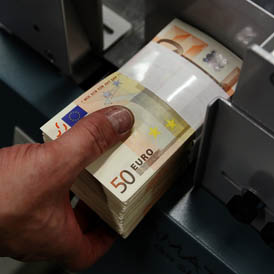Greek gloom at looming ‘dead end’ bailout
Greece is widely expected to be granted a new 130bn euro (£110bn) bailout, with eurozone financial ministers meeting in Brussels to iron out more unpopular austerity measures.

The mooted bailout – which would eclipse Athens’ first 110bn euros (£91bn) lifeline – has been delayed by disputes over a series of last-minute conditions attached to the support.
As well as a long-agreed austerity package, the Greek government has been told to find 325m euros (£270m) of immediate savings in this year’s budget.
The prospect of a solution to the Greek debt crisis gave markets a lift. But a resolution depends on the implementation of tough austerity measures – and the mood on the streets of Athens was less hopeful.
Retired teacher Michalis Vikendios said: “Even if they cut all pensions, all benefits for the unemployed, and disabled people, the problem will not be solved. It’s a dead end.
“No matter how much money we get if commerce doesn’t start working, if they don’t write down debt we will never exit the crisis.”
Another condition is to deliver a written pledge signed by key political parties that the austerity measures will be honoured even if there is a change of government in forthcoming elections.
The new savings have been found, says Athens, but failure to produce cross-party assurances on the austerity package forced the cancellation of emergency talks in Brussels last week, and triggered open discussion about the prospect of letting Greece default and leave the euro.
European Commission officials in Brussels insist the aim is to keep Greece in the euro, with hopes rising of a final bailout deal, without which Greece will not be able to meet its next debt payments on 20 March.